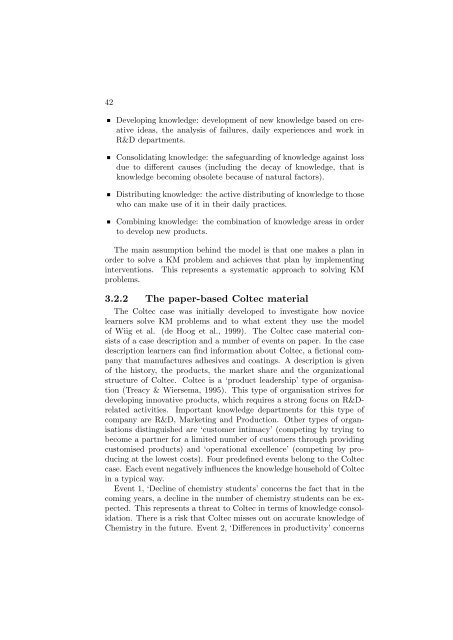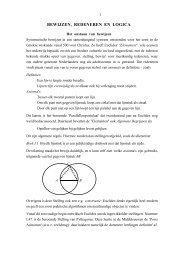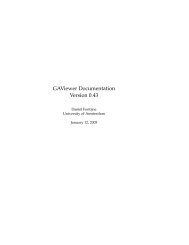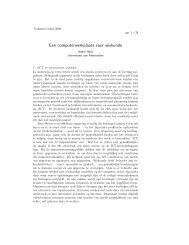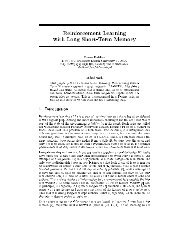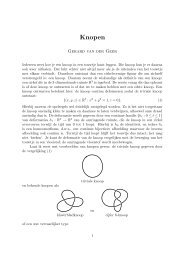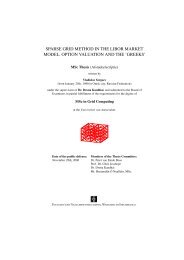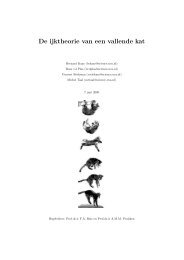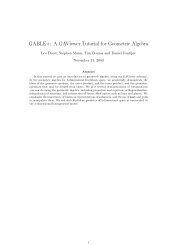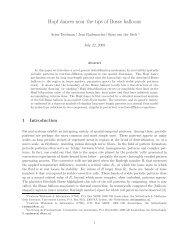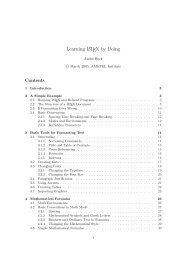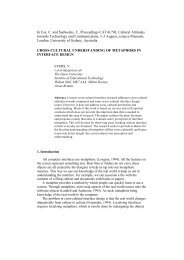The role of metacognitive skills in learning to solve problems
The role of metacognitive skills in learning to solve problems
The role of metacognitive skills in learning to solve problems
You also want an ePaper? Increase the reach of your titles
YUMPU automatically turns print PDFs into web optimized ePapers that Google loves.
42<br />
Develop<strong>in</strong>g knowledge: development <strong>of</strong> new knowledge based on creative<br />
ideas, the analysis <strong>of</strong> failures, daily experiences and work <strong>in</strong><br />
R&D departments.<br />
Consolidat<strong>in</strong>g knowledge: the safeguard<strong>in</strong>g <strong>of</strong> knowledge aga<strong>in</strong>st loss<br />
due <strong>to</strong> different causes (<strong>in</strong>clud<strong>in</strong>g the decay <strong>of</strong> knowledge, that is<br />
knowledge becom<strong>in</strong>g obsolete because <strong>of</strong> natural fac<strong>to</strong>rs).<br />
Distribut<strong>in</strong>g knowledge: the active distribut<strong>in</strong>g <strong>of</strong> knowledge <strong>to</strong> those<br />
who can make use <strong>of</strong> it <strong>in</strong> their daily practices.<br />
Comb<strong>in</strong><strong>in</strong>g knowledge: the comb<strong>in</strong>ation <strong>of</strong> knowledge areas <strong>in</strong> order<br />
<strong>to</strong> develop new products.<br />
<strong>The</strong> ma<strong>in</strong> assumption beh<strong>in</strong>d the model is that one makes a plan <strong>in</strong><br />
order <strong>to</strong> <strong>solve</strong> a KM problem and achieves that plan by implement<strong>in</strong>g<br />
<strong>in</strong>terventions. This represents a systematic approach <strong>to</strong> solv<strong>in</strong>g KM<br />
<strong>problems</strong>.<br />
3.2.2 <strong>The</strong> paper-based Coltec material<br />
<strong>The</strong> Coltec case was <strong>in</strong>itially developed <strong>to</strong> <strong>in</strong>vestigate how novice<br />
learners <strong>solve</strong> KM <strong>problems</strong> and <strong>to</strong> what extent they use the model<br />
<strong>of</strong> Wiig et al. (de Hoog et al., 1999). <strong>The</strong> Coltec case material consists<br />
<strong>of</strong> a case description and a number <strong>of</strong> events on paper. In the case<br />
description learners can f<strong>in</strong>d <strong>in</strong>formation about Coltec, a fictional company<br />
that manufactures adhesives and coat<strong>in</strong>gs. A description is given<br />
<strong>of</strong> the his<strong>to</strong>ry, the products, the market share and the organizational<br />
structure <strong>of</strong> Coltec. Coltec is a ‘product leadership’ type <strong>of</strong> organisation<br />
(Treacy & Wiersema, 1995). This type <strong>of</strong> organisation strives for<br />
develop<strong>in</strong>g <strong>in</strong>novative products, which requires a strong focus on R&Drelated<br />
activities. Important knowledge departments for this type <strong>of</strong><br />
company are R&D, Market<strong>in</strong>g and Production. Other types <strong>of</strong> organisations<br />
dist<strong>in</strong>guished are ‘cus<strong>to</strong>mer <strong>in</strong>timacy’ (compet<strong>in</strong>g by try<strong>in</strong>g <strong>to</strong><br />
become a partner for a limited number <strong>of</strong> cus<strong>to</strong>mers through provid<strong>in</strong>g<br />
cus<strong>to</strong>mised products) and ‘operational excellence’ (compet<strong>in</strong>g by produc<strong>in</strong>g<br />
at the lowest costs). Four predef<strong>in</strong>ed events belong <strong>to</strong> the Coltec<br />
case. Each event negatively <strong>in</strong>fluences the knowledge household <strong>of</strong> Coltec<br />
<strong>in</strong> a typical way.<br />
Event 1, ‘Decl<strong>in</strong>e <strong>of</strong> chemistry students’ concerns the fact that <strong>in</strong> the<br />
com<strong>in</strong>g years, a decl<strong>in</strong>e <strong>in</strong> the number <strong>of</strong> chemistry students can be expected.<br />
This represents a threat <strong>to</strong> Coltec <strong>in</strong> terms <strong>of</strong> knowledge consolidation.<br />
<strong>The</strong>re is a risk that Coltec misses out on accurate knowledge <strong>of</strong><br />
Chemistry <strong>in</strong> the future. Event 2, ‘Differences <strong>in</strong> productivity’ concerns


